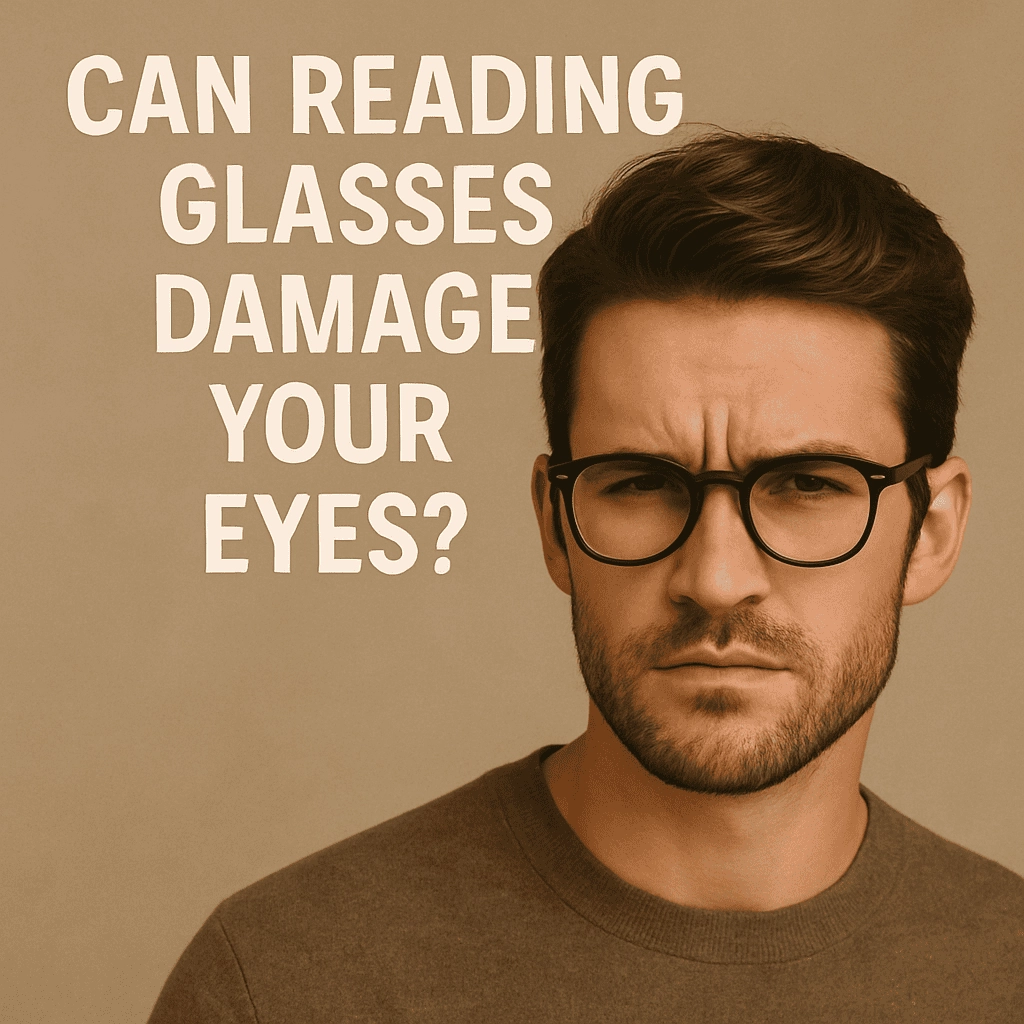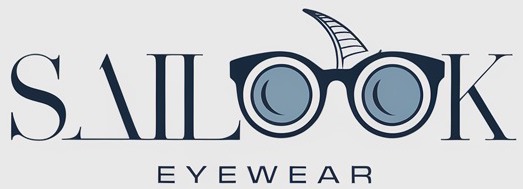Reading glasses are essential for millions of people, especially those dealing with presbyopia, a condition that typically occurs after the age of 40. These glasses help people see clearly for close-up tasks like reading, writing, or using a smartphone. However, many people wonder, “Can reading glasses make your eyes worse?” In this article, we will explore the impact of reading glasses on your eye health, debunk some common myths, and provide insights on how to use them properly without causing harm.

1. Can Reading Glasses Make Your Eyes Worse?
Reading glasses have become a staple for individuals dealing with age-related vision loss. But despite their effectiveness, many wonder if they could be causing more harm than good. The simple answer is no—reading glasses do not damage your eyes. However, there are some important nuances to keep in mind.
But here’s the kicker—using the wrong prescription or overusing reading glasses can cause temporary discomfort, but it does not lead to permanent vision deterioration. The primary concern lies in wearing glasses that are not correctly prescribed. When you use the wrong prescription, your eyes may become strained, and this strain can cause headaches, blurred vision, or eye fatigue. These symptoms are temporary and usually subside once you correct the prescription.
Moreover, it’s also important to understand that reading glasses are designed to help individuals with presbyopia. Presbyopia is a natural part of aging, where the eye’s lens loses flexibility and makes it harder to focus on close objects. If you already suffer from presbyopia and use the appropriate glasses, they will alleviate the strain, not worsen your condition.
What’s the real story? Reading glasses are designed to improve vision, not to worsen it. The key is to use them properly, ensuring that you are using the right prescription. If you’re unsure about your prescription, it’s always best to visit an eye care professional who can recommend the best eyewear solution for you.
| Condition | Impact of Reading Glasses |
|---|---|
| Correct Prescription | Relief from eye strain |
| Incorrect Prescription | Temporary eye strain and discomfort |
2. How Do Reading Glasses Work?
Reading glasses work by compensating for the loss of focusing ability that happens with age. As we age, the lens in our eyes becomes less flexible, which makes it harder to focus on close objects. Reading glasses are equipped with convex lenses that magnify text and images, making them easier to see.
Ready for the good part? The lenses in reading glasses bend light to help your eyes focus. These lenses are designed to correct the focal length, so objects appear clearer and closer. For example, if you’re reading a book or looking at your smartphone, the reading glasses enable your eyes to focus on the small text that would otherwise be blurry.
Reading glasses are typically available in various strengths or powers, which are measured in diopters. A higher diopter number means stronger magnification. You can purchase reading glasses over the counter or have them custom-made by an optometrist or optician based on your prescription.
| Type of Lens | Purpose |
|---|---|
| Single Vision Lenses | Improve near vision for reading or close work |
| Bifocal Lenses | Include both near and distance vision correction |
| Progressive Lenses | Gradually change from near to far vision without lines |
3. Are Reading Glasses Safe for Long-Term Use?
If you are wondering whether using reading glasses for long periods is safe, rest assured that they are safe when used correctly. But here’s the kicker—while reading glasses themselves don’t cause any harm, they should not be overused, especially when they are not prescribed correctly. If you don’t need glasses for distance vision but wear them for long periods, your eyes might adapt in ways that can cause strain.
The key to using reading glasses long-term is ensuring that you have the right prescription. If you wear the wrong prescription, you might start to feel headaches, dizziness, or eye discomfort. What’s the real story? If your glasses are correctly prescribed and used for appropriate tasks like reading, they will not cause long-term damage.
| Key Factor | Impact on Eye Health |
|---|---|
| Correct Prescription | Safe for long-term use |
| Incorrect Prescription | Potential for temporary discomfort |
4. Can Reading Glasses Make Your Vision Worse?
Some people worry that reading glasses can worsen their vision over time, especially if they start wearing them at an older age. The truth is, reading glasses do not make your vision worse. This is where it gets interesting… what they can do is provide immediate relief for close-up tasks, but they won’t reverse or slow down the natural aging process that affects your eyes.
Presbyopia, the condition for which reading glasses are typically prescribed, is progressive, meaning that it gets worse with age. However, reading glasses themselves do not accelerate this process. If your vision changes over time, your prescription may need to be updated to accommodate these changes, but that’s a natural part of aging.
In short, wearing reading glasses as prescribed will not harm your eyes or make your vision worse. If anything, they will improve your quality of life by reducing eye strain.
| Change in Vision | Effect of Reading Glasses |
|---|---|
| Presbyopia | Temporary correction for near vision |
| Vision Deterioration | Prescription update needed for continued clarity |
5. Why Do My Eyes Feel Strained When I Wear Reading Glasses?
If your eyes feel strained while wearing reading glasses, it could be due to several reasons. You might be wondering—why does this happen? Eye strain can occur if your glasses prescription is incorrect or if you’ve been wearing them for too long without taking breaks. Another common cause of eye strain is poor posture while reading or working on a screen.
Improper fit can also contribute to discomfort. If your reading glasses don’t sit properly on your face, they can cause additional strain on your eyes, making it harder for you to focus. Another possible cause is glare or poor lighting when reading. This is where it gets interesting—the solution to eye strain is simple: ensure your glasses fit well, take regular breaks, and read in well-lit environments.
| Cause of Eye Strain | Solution |
|---|---|
| Incorrect Prescription | Update prescription with eye care professional |
| Poor Posture | Maintain proper posture when reading |
| Improper Fit | Adjust glasses for comfort and fit |
| Glare | Use anti-reflective lenses and proper lighting |
6. Can Overuse of Reading Glasses Lead to Dependency?
One of the myths surrounding reading glasses is that overusing them can lead to dependency. The truth is, here’s the kicker—reading glasses do not make your eyes “dependent” on them. They simply help your eyes compensate for presbyopia. Your eyes won’t become reliant on them, and they won’t weaken your eye muscles.
However, overusing reading glasses when they are not needed, especially for tasks that require distance vision, can cause discomfort. It’s important to wear them only for close-up tasks like reading or looking at your phone. What’s the real story? Reading glasses are not addictive or harmful in that way, but wearing them unnecessarily can lead to temporary discomfort.
| Activity | Correct Use of Reading Glasses |
|---|---|
| Reading | Use reading glasses for short periods |
| Distance Viewing | Avoid wearing reading glasses for long-distance tasks |
7. How Can You Prevent Eye Strain When Using Reading Glasses?
Preventing eye strain is essential when using reading glasses regularly. This is where it gets interesting… by following a few simple steps, you can significantly reduce strain and fatigue. First, make sure your prescription is up to date, as using an outdated prescription can cause unnecessary strain.
Second, take regular breaks—this is crucial when working on a screen for prolonged periods. The 20-20-20 rule is an excellent guideline: every 20 minutes, look at something 20 feet away for 20 seconds. Lastly, make sure your reading environment is well-lit, as poor lighting can exacerbate strain.
| Prevention Tips | Why It Works |
|---|---|
| Update Prescription Regularly | Reduces strain from incorrect magnification |
| Follow 20-20-20 Rule | Relieves eye strain from prolonged focus |
| Improve Lighting | Reduces glare and fatigue during reading |
8. Can Wearing Reading Glasses Lead to Eye Weakness?
There is a common misconception that wearing reading glasses can lead to eye weakness or deterioration. But here’s the kicker—this is not true. Reading glasses do not weaken your eye muscles. Instead, they help reduce strain by providing magnification for close-up tasks.
Your eyes will continue to adjust naturally over time, even if you wear reading glasses. What’s the real story? The only way reading glasses could potentially “weaken” your eyes is if they are used incorrectly, such as for long-distance viewing. But this is a matter of proper usage rather than an inherent issue with the glasses themselves.
| Potential Cause | Explanation |
|---|---|
| Incorrect Use | Prolonged use for distance vision may cause discomfort |
| Correct Use | No risk of weakening eye muscles from proper use |
9. What Are the Alternatives to Prescription Reading Glasses?
While prescription reading glasses are a great solution for many people, there are alternatives available. You might be wondering—what are my other options? One alternative is magnifying glasses, which provide a similar effect to reading glasses but don’t require a prescription. These are available over-the-counter and are generally more affordable.
Another option is contact lenses, which can be prescribed for reading vision as well as for distance vision, offering a more discreet solution. Additionally, for those who prefer not to use glasses at all, laser eye surgery may be an option to correct presbyopia permanently.
| Alternative | Pros and Cons |
|---|---|
| Magnifying Glasses | Affordable but less convenient |
| Contact Lenses | Discreet, but requires more maintenance |
| Laser Surgery | Permanent solution but costly |
10. How Often Should You Change Your Reading Glasses?
Over time, your vision may change, and your reading glasses may no longer provide the same level of clarity. What’s the real story? You should change your reading glasses whenever you notice any changes in your vision, or if your current glasses are uncomfortable or damaged. Eye care professionals typically recommend getting your eyes checked every 1-2 years to ensure your prescription is up to date.
| Reason for Change | Action |
|---|---|
| Changes in Vision | Schedule an eye exam and update prescription |
| Discomfort or Damage | Replace glasses for better comfort |
11. How to Choose the Right Pair of Reading Glasses?
Choosing the right pair of reading glasses involves considering both comfort and functionality. Ready for the good part? First, ensure that your glasses fit well and don’t slide down your nose. Second, choose lenses that are the right strength for your vision needs. If you’re unsure, consult an eye care professional to get the best advice.
Consider also the type of frame material. Lightweight materials like titanium or plastic are comfortable for long-term use. What’s the real story? Choosing the right pair comes down to personal preference and the level of comfort you need for your daily activities.
| Consideration | Recommendation |
|---|---|
| Lens Strength | Consult an optometrist for accurate prescription |
| Frame Material | Choose lightweight options for comfort |
12. What Happens If I Don’t Wear Reading Glasses When Needed?
If you don’t wear your reading glasses when needed, you might experience eye strain, headaches, and blurred vision. But here’s the kicker—the consequences are temporary, and your vision won’t permanently worsen. However, regularly straining your eyes can cause discomfort that impacts your ability to read, work, or perform other tasks.
| Consequence | Impact |
|---|---|
| Not Wearing Glasses | Temporary eye strain and discomfort |
| Using Correct Prescription | Clear vision and comfort for close-up tasks |
13. Can Poor-Quality Reading Glasses Harm My Eyes?
Using low-quality, non-prescription reading glasses may cause more harm than good. What’s the real story? While they may seem like an affordable option, these glasses can lead to eye strain, discomfort, and even headaches. If the lenses are not made to the correct magnification or the frames don’t fit properly, you may experience blurred vision or worsening symptoms.
| Quality of Glasses | Impact |
|---|---|
| Low-Quality Glasses | Potential discomfort and eye strain |
| High-Quality Prescription Glasses | Clear vision and reduced strain |
14. How Do You Know if Your Reading Glasses Are the Right Prescription?
To know if your reading glasses have the right prescription, consider whether you’re experiencing any discomfort while using them. What’s the real story? If you feel eye strain, headaches, or blurry vision, your prescription may need adjustment. The best way to ensure you’re wearing the right pair is to visit an eye care professional for a check-up.
| Signs of Incorrect Prescription | Action Needed |
|---|---|
| Eye Strain | Schedule an eye exam |
| Blurry Vision | Update prescription lenses |
15. When Should You Consult an Eye Care Professional About Your Reading Glasses?
You should consult an eye care professional if you experience significant discomfort or changes in vision while using reading glasses. But here’s the kicker—regular eye exams are essential for maintaining optimal eye health, especially as you age.
| Reason for Consultation | Action |
|---|---|
| Persistent Discomfort | Visit an eye care professional |
| Vision Changes | Update prescription regularly |
Conclusion
In this article, we discussed how reading glasses can help correct presbyopia without causing harm to your eyes. But here’s the kicker—when used correctly, they provide clarity and comfort, reducing eye strain. It’s essential to use the right prescription and ensure your glasses fit well to avoid discomfort. Remember, reading glasses do not make your vision worse, but wearing the wrong prescription can lead to temporary strain. If you’re experiencing discomfort, consult an eye care professional to ensure you have the correct lenses.
FAQ Section
- Q1: What are reading glasses?
Reading glasses are eyewear designed to help individuals with presbyopia, a condition that affects near vision as people age. - Q2: How do reading glasses work?
Reading glasses magnify text and objects to make them easier to see, compensating for the loss of close-up vision. - Q3: Can reading glasses make my eyes worse?
No, reading glasses do not cause permanent damage to your eyes; however, wearing the wrong prescription can cause temporary discomfort or strain. - Q4: How often should I replace my reading glasses?
You should replace your reading glasses if your vision changes or if the lenses become scratched, damaged, or uncomfortable. - Q5: Can wearing cheap reading glasses cause eye strain?
Yes, poor-quality reading glasses with incorrect prescriptions or lenses may lead to eye strain and discomfort.

